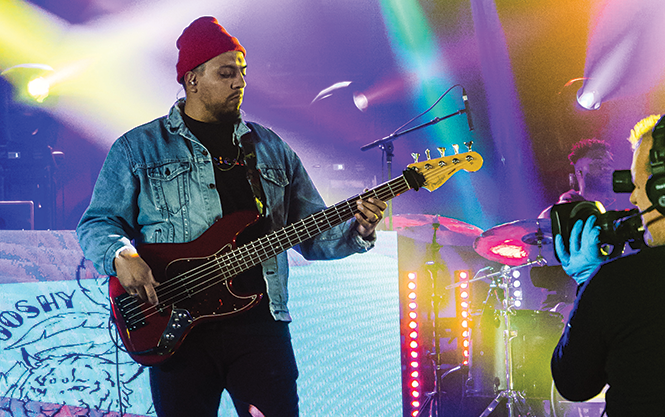Antidotes for Artists
Musicians get creative to find income streams during the pandemic
By Erin Moore @errrands_While all aspects of public social life have been pretty much shut down indefinitely, most folks are either relying on unemployment checks from the loss of a job or working from home. This is not necessarily the case, however, for those who have chosen to pursue art—and in particular, music—full time. The hustle is real for these individuals, who make their livings from events and parties, production and music lessons. It's a scrappy way to earn that requires a constant creative approach to money-making and sensing opportunity, even as the loss of avenues for playing live music leaves musicians—including many locals—struggling.
Local musician Norbert Bueno frames it best: "To be able to make an income in this industry, you need to do more than just play an instrument. I play bass currently (or I did before this pandemic) behind a few different artists, including Joshy Soul, Alex Boye, Mimi Knowles, and The Cool." Bueno, however, also adds music production to his résumé, for labels like Warner Chappell. "A big portion of my income comes from all these different types of streams," he says.
Bueno also put in time with popular "corporate party band" New Soul Brigade, where he met fellow local musician Adam Fuller, who has been left in a similar lurch with the drying up of gigs. Fuller splits his time between making music as keyboard player with the popular and successful indie pop group Ivouries—who as recently as 2018 were on a grand tour over to China—and doing a handful of music-related odd jobs. Like Bueno, he would play gigs like weddings and corporate events, but also works in production and engineering and teaches music on the side.
With the economically destructive wave accompanying the pandemic, Fuller lost a gig at the Qualtrics X4 Summit originally scheduled for mid-March, an Ivouries slot at Boise's Treefort Festival (a fate shared by several other SLC artists and bands) and "a wedding or two." Fuller says grimly, "I've probably lost a couple thousand dollars in gig revenue." The one saving grace, it seems, is that Ivouries didn't have any tours planned besides that Treefort appearance, and have instead been recording an EP, which needs only mastering and a release date before it can hit the virtual streets.
Besides finishing up that EP, Fuller is struggling with the urge to reach for creativity during this lulling time, while the energy to act proves elusive. "Like many other creatives right now, I've simultaneously been feeling pressure to make art and a complete lack of motivation, which has been frustrating. I'm trying to be gentle with myself and not force things too much," he says. He has still been spending time trying to diversify his income, through Skype sessions with old music pupils and through hopefully-successful stabs at landing new commercial gigs.
For his part, Bueno has also been forced to think creatively, with live gigs and production gigs alike drying up. Among his projects is providing a space for out-of-work musicians like himself: a new non-profit called Social Antidote, a live-stream concert series with a focus on high-level production and spotlighting local artists impacted by the crisis.
"The idea came from necessity," Bueno says. "We lost our gigs, which is our livelihood. We needed something." He says the idea was already "floating around" between himself and a studio friend named Myke Johnson before the pandemic even hit. With the help of the production company Fat Fish Media, and friends Isaac Gonzalez and Bri Ray, they were able to get the idea off the ground, with initial performances by Ray, Gizmo, Joshy Soul and The Cool, Beuno's side project STAKX, Cherry Thomas and Alex Boye. The live streams are meticulously put together, with high standards of sanitation, social distancing and sanitary stations available for everyone present. Each set is free to viewers, but donations are encouraged, and can be made online at the performances' online home, socialantidote.live.
Both Bueno and Fuller express their belief that the investment in streaming culture now—and however long we end up depending on it for live entertainment and human connection throughout this ordeal—could end up being a lasting part of music culture. "I think the whole entertainment industry will change," Bueno says. "It will take some time before people feel comfortable going out to large gatherings. New ideas and forms of entertainment will rise. You can see it already, with streams and different types of interactions like Zoom. Live streaming will be an even bigger market."
It's both a scary and an exciting pill to swallow—and as Fuller points out, could mark an important shift for an arts culture deeply "undervalued and underpaid." It's possible that artists might continue to struggle as they always have, even after and despite the cultural boat-rocking of COVID-19. But, as Fuller says, "On the other hand, maybe people will realize the real value of entertainers and be more willing to pay musicians for their time and talent." Here's hoping for the latter.
More by Erin Moore
-
The Granary, The Florist and the theme park-ification of Salt Lake City
Opinion
- Mar 13, 2024
-
Salt Lake City's dense, walkable spots are great for business—if businesses can find one
Small Lake City
- Feb 14, 2024
-
Dating counselors help singles move past relationship hiccups and get to the next date.
Looking for Love
- Feb 7, 2024
- More »
Latest in Music
Readers also liked…
-
The Alpines Head North
Local band's debut concept album finds musical bliss in the apocalypse.
- Feb 7, 2024




